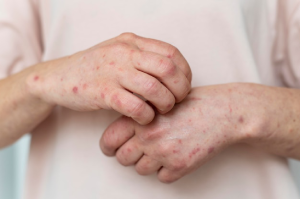Chikungunya is a viral disease transmitted by mosquitoes, primarily the Aedes species. It is characterized by flu-like symptoms and can cause significant joint pain. It is important to recognize the chikungunya symptoms early on to seek appropriate medical care and management. In this article, we will discuss the common symptoms associated with chikungunya and provide insights into chikungunya treatment.
Symptoms of Chikungunya:
- Fever: One of the most common initial chikungunya symptoms is a sudden onset of high-grade fever. The fever may last for a few days or even up to a week. You may experience chills along with a fever.
- Joint Pain: Joint pain, also known as arthralgia, is a hallmark symptom of chikungunya infection. The pain typically affects multiple joints, including the wrists, ankles, knees, and fingers. The intensity of joint pain can vary from mild to severe.
- Headache: Many individuals infected with chikungunya may experience headaches, which can range from mild to severe in intensity. These headaches are often accompanied by other symptoms such as fever and joint pain.
- Rash: A characteristic rash may develop in some cases of chikungunya infection. The rash usually appears within two to three days after the onset of fever and commonly affects the trunk and limbs.
- Muscle Pain: Muscle pain or myalgia is another common symptom seen in individuals with chikungunya infection. This can be generalized or localized to specific muscle groups.
It is important to note that while these symptoms are typical of chikungunya infection, they can also be present in other viral illnesses such as dengue or Zika virus infections. Therefore, it is crucial to consult a healthcare professional for an accurate diagnosis through chikungunya test.
Diagnosis:
If you suspect you may have chikungunya, your healthcare provider may recommend a chikungunya test to confirm the infection. The chikungunya test is typically done by detecting specific antibodies in the blood. These antibodies, known as IgM antibodies, are produced by the body in response to the viral infection.
The IgM Antibody Serum Chikungunya Test is a reliable diagnostic tool used to detect recent or acute chikungunya infections. It is important to note that this test is most accurate when performed within the first week of symptom onset.
Treatment:
Currently, there is no specific antiviral chikungunya treatment available. Treatment primarily focuses on relieving symptoms and managing complications, if any. Here are some general measures that can help alleviate symptoms:
- Pain Relievers: Over-the-counter pain relievers such as acetaminophen (paracetamol) can help reduce fever and alleviate joint and muscle pain associated with chikungunya. However, it is essential to consult your doctor before taking any medication.
- Fluid Intake: Drinking plenty of fluids such as water, coconut water, and oral rehydration solutions can help prevent dehydration caused by fever and sweating.
- Rest: Getting adequate rest is crucial in allowing your body to recover from the infection.
Prevention:
Prevention plays a vital role in reducing the risk of chikungunya infection. Here are some preventive measures you can take:
- Mosquito Control: Eliminate potential breeding sites for mosquitoes by removing stagnant water sources around your home or workplace.
- Use Mosquito Repellents: Apply mosquito repellents on exposed skin and use mosquito nets while sleeping.
- Wear Protective Clothing: Cover your arms and legs with long-sleeved shirts and pants to minimize mosquito bites.
Conclusion
In conclusion, recognizing the signs of chikungunya infection is crucial for early detection through chikungunya test and appropriate management. If you experience chikungunya symptoms such as fever, joint pain, headache, rash, or muscle pain, it is important to consult a healthcare professional for a proper diagnosis. Remember to take preventive measures to reduce the risk of chikungunya infection. Stay informed and stay protected!


